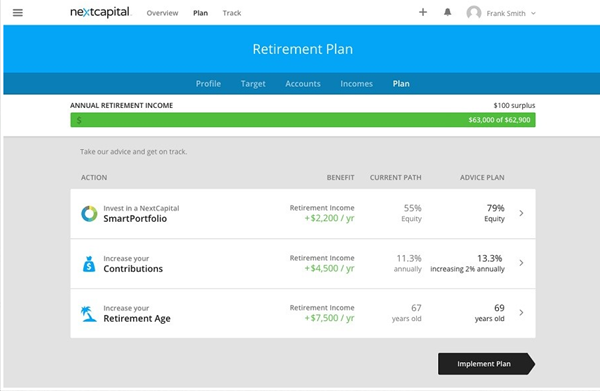NextCapital takes on competing retirement robos with
401(k) account aggregation
With such automated functionality, advisers can pull data from various
sources to create a comprehensive financial plan
Sep 22, 2015 @ 12:01 pm
By
Alessandra Malito

(nextcapital.com)
|
NextCapital, a robo-adviser that focuses on retirement, is implementing
automated 401(k) account aggregation, touting it will help advisers to peer into
a client's retirement assets to get a fuller financial picture.
Through its 401(k) Digital Advice Platform, advisers will be able to create a
retirement savings plan and portfolio construction recommendations, while taking
into consideration what clients already have in their defined-contribution
accounts.
The goal is for advisers to center an entire financial plan around the
work-sponsored retirement plan.
"It's really about aggregating everything else into the 401(k)," said Rob
Foregger, co-founder of NextCapital. "The 401(k) is the primary place for
Americans to save for and manage retirement."
The company will be pulling the data from technology created in-house, as
opposed to some other robo-advisers who partner with data-aggregation and
analytics services such as Quovo and Yodlee.
Other platforms that offer account aggregation include retirement robo-adviser
Financial Engines and Morningstar.
Mr. Foregger said that it is more crucial now than ever before to do something
like this, especially with the Labor Department and White House
pushing for a fiduciary standard for retirement
plans, which would mandate that all financial professionals
advise clients with their best interests top-of-mind.
"There is a push from consumer-protection groups, so scalable personal advice
will become more mainstream," he said.
It has the potential to do so for advisers' practices as well.
Kristi Sullivan, adviser and owner of Sullivan Financial Planning, said that
automated account aggregation for 401(k)s would facilitate more detailed,
tailored conversations with clients about their retirement accounts. It would
help advisers to alleviate any issues that clients may not even know they have.
Ms. Sullivan said what she sees most often is clients who are invested in
multiple target date funds. She then spends the time to explain what these funds
are and how they're meant to be used.
As defined-benefit plans go the way of the dodo bird and more people are anxious
about relying on Social Security,
401(k)s have become an integral
part of the conversation between advisers and clients.
"For a lot of people, a 401(k) is the biggest account [they have] and certainly
the one that grows the fastest," Ms. Sullivan said. "If invested poorly or
inefficiently, it's definitely a conversation advisers should have with their
clients."
Account aggregation will help
advisers to make such communication even more relevant and customized, said
Yoav Zurel, the chief executive
of FeeX, a technology provider that looks to reduce retirement plan fees.
"Because we have more access to data, we get more transparency," Mr. Zurel said,
noting that advisers and investors should look closely at the exact fees that
these 401(k) plans — and the funds on their investment menus — charge.
"If I am advising on household portfolios, I should take the 401(k) assets into
account as a significant part of an entire diversification strategy," Mr. Zurel
said. "I can provide value on the entire wallet of a user."
More insight: Quovo CEO Lowell Putnam on the hottest trends in data aggregation: